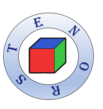About us
Scientific computing is undergoing a new revolution with the expansion of tensor calculus, after the periods of pre-dominance of vector and matrix based algebra in sciences. Tensors are nowadays ubiquitous in many domains of applied mathematics, computer science, signal processing, data processing, and in the emerging area of quantum computing.
Despite its extraordinary modeling power, classical tensor calculus does not yet fully exploit the underlying structure of tensor models, and suffers from the poor understanding of tensor properties. The industry, which is relying more and more on Machine Learning techniques and involving big data processing, also needs to address new technological locks arising from the lack of accuracy and certification in the developed tools, the usage of intensive computational resources and the high man power required to develop and apply these tools. Both classical algorithmic approaches and technologies are facing the curse of dimension, which prevents the methods and tools to adapt well to large scale problems.
To address these locks, there is a strong need for a better understanding and optimisation of tensor computations, both from a theoretical and a practical perspective.The recent and important impact of tensor calculus in many application domains has lead to a paradoxical situation where techniques such as Machine Learning are employed in a blind manner, without being able to explain their behavior. Understanding the strengths and current limitations of these techniques is yet missing. Hence, there is also a strong need to educate and train new young researchers to advanced knowledge and methodologies that classical curricula are not yet offering.
TENORS aims to form the next generation of researchers and engineers in scientific computing and data analysis,disrupting the current paradigms of tensor calculus by exploiting cutting-edge research in geometry and optimisation.
The objective of TENORS is to conduct advanced research that addresses critical challenges in the field of tensor
computation, and to feed an innovative and ambitious PhD program to train highly qualified young scientists in new scientific and technological knowledge.





